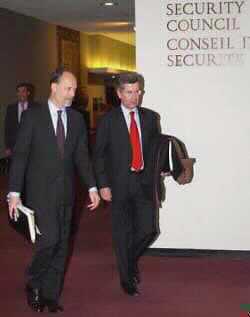The United States and France said they had agreed on a draft resolution demanding that Iraq disarm and they hoped the UN Security Council would adopt it unanimously within a day. But statements by diplomats at the UN headquarters in New York and a spokesman in Washington indicated that differences of interpretation persisted. "A positive dynamic has been launched, and we hope that a consensus will be reached in the Security Council at Friday's vote," a spokeswoman for French President Jacques Chirac said in Paris.
Spokeswoman Catherine Colonna said Chirac had telephoned US President George W. Bush and "finalized an agreement on the points that remained outstanding between France and the United States."
Bush told a news conference in Washington that he had also spoken to Russian President Vladimir Putin and was "optimistic that we will get the resolution vote Friday."
France and Russia led opposition to earlier versions of the draft, arguing that it contained "hidden triggers" for automatic military action against Iraq.
French diplomats at the UN said the redrafting would make it clear that any future violations of Iraq's obligations would be reported to the Security Council for "assessment".
They added that only the head of the UN Monitoring, Verification and Inspection Commission (UNMOVIC) or the director general of the International Atomic Energy Agency (IAEA) could make such a report.
But in Washington, State Department spokesman Richard Boucher said the United States, along with other members of the Security Council, maintained the right to present Iraqi violations on their own without going through the UN arms inspectors or the IAEA.
Haggling among council diplomats over the point was a "red herring," Boucher said.
"On any issue, any member of the council can report anything it wants and ask the council to look at it and decide what action is appropriate," Boucher said.
"We'll look at changes that other people might have, if they're consistent," he said, but stressed: "However it's worded ... everybody has the right to bring things to the council."
Earlier, the acting council president, Zhang Yishan, China's deputy ambassador to the United Nations, said the 15 members were moving closer towards agreement.
"The positions of different sides are getting closer and closer," he said after two and a half hours of consultations Thursday morning.
The council reconvened early in the evening to continue deliberations, and diplomats said the United States and Britain -- the co-sponsors of the draft -- were hoping to persuade all 15 members to vote for it.
Many people, from UN Secretary General Kofi Annan down, have emphasized the importance of council unity.
Among them, French Ambassador Jean-David Levitte said it was common sense to note that "if the council this time is divided, then the mission given to the inspectors will be much more difficult."
The chairman of UNMOVIC, Hans Blix, took part in Thursday's consultations.
Iraq would have seven days to confirm its intention of complying fully with the resolution and another 23 days to make a full declaration of its programmes to develop chemical, biological, and nuclear weapons and ballistic missiles.
The draft says this must include programmes which Iraq claims are not related to weapon production, but Blix has said it might be difficult to give a full account of Iraq's petro-chemical industry in so short a time.
PHOTO CAPTION
Deputy U.S. Ambassador to the U.N. James Cunningham (L) and French Ambassador to the U.N. Jean-David Levitte enter the United Nations Security Council to discuss the latest draft of the resolution on Iraq, November 7, 2002. The United States and France came to a last-minute agreement on a tough U.N. resolution giving Iraq a last chance to disarm or face war, making a vote on Nov. 8 fairly certain. (Chip East/Reuters)
- Author:
& News Agencies - Section:
WORLD HEADLINES


 Home
Home Discover Islam
Discover Islam Quran Recitations
Quran Recitations Lectures
Lectures
 Fatwa
Fatwa Articles
Articles Fiqh
Fiqh E-Books
E-Books Boys & Girls
Boys & Girls  Women
Women










